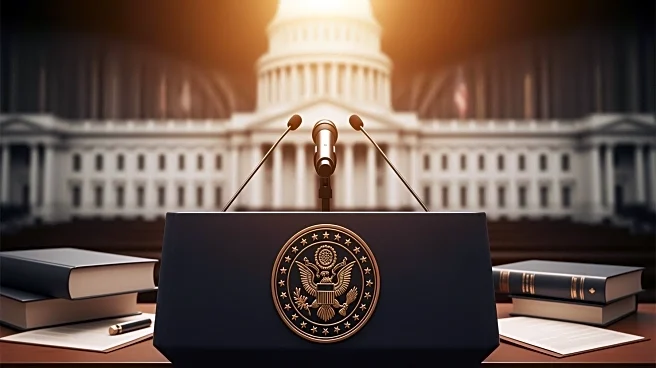What's Happening?
The Trump administration's decision to implement significant workforce cuts at the Cybersecurity and Infrastructure Security Agency (CISA) has sparked renewed criticism from Democratic lawmakers. Rep. Eric Swalwell, a leading Democrat on the House Homeland
Security Committee's cyber subcommittee, has expressed strong opposition to these reductions. In a letter to acting CISA Director Madhu Gottumukkala, Swalwell demanded the immediate cessation of workforce cuts, reinstatement of dismissed employees, and detailed explanations regarding the impact of these reductions. The cuts have reportedly included firings, layoffs, and forced reassignments, which Swalwell argues undermine CISA's ability to address cybersecurity threats effectively. The agency's bipartisan support has diminished as Republicans have criticized its election security efforts in previous years.
Why It's Important?
The workforce reductions at CISA are significant as they potentially weaken the agency's capacity to safeguard U.S. critical infrastructure against cybersecurity threats. With cybersecurity posing an increasing risk to national security, the agency's ability to maintain sufficient personnel is crucial. The termination of partnerships, such as the one with the Multi-State Information Sharing and Analysis Center, further exacerbates the situation, leaving state and local governments vulnerable. The political dynamics surrounding CISA's operations reflect broader tensions between the Trump administration and Democratic lawmakers, impacting the agency's effectiveness and bipartisan support.
What's Next?
The ongoing debate over CISA's workforce cuts is likely to continue, with Democratic lawmakers seeking more transparency and accountability from the Trump administration. Swalwell's letter requests detailed information on employee headcounts and the status of security advisers, which could lead to further scrutiny and potential legislative actions. The Department of Homeland Security's response to Swalwell's letter remains uncertain, but the issue may prompt discussions on cybersecurity policy and funding in Congress.
Beyond the Headlines
The situation at CISA highlights the complex interplay between cybersecurity policy and political agendas. The agency's role in election security has been a point of contention, reflecting broader debates over misinformation and governmental authority. The workforce reductions may also have long-term implications for the U.S.'s ability to respond to evolving cyber threats, potentially affecting public trust in governmental cybersecurity efforts.















